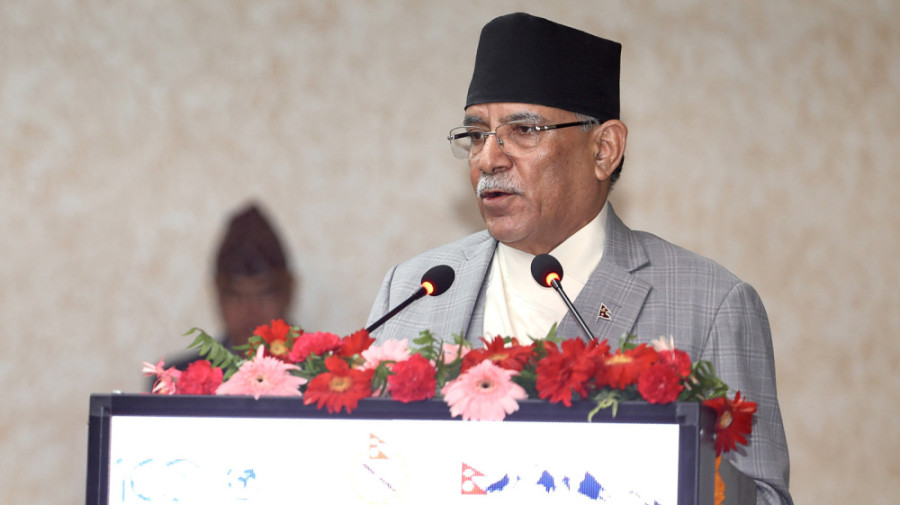National
Prime minister wants transitional justice bill endorsed before his US visit
Sub-panel of Law and Human Rights Committee will start detailed discussions on the bill tomorrow. Leaders expect some consensus among major parties today.
Binod Ghimire
For years, Nepal has claimed at various international forums that the Enforced Disappearances Enquiry, Truth and Reconciliation Commission Act would be amended in line with the Supreme Court verdict and its international obligations.
However, eight years since the 2015 court ruling, Nepal has failed to abide by its commitment, raising scepticism at the international level.
With Prime Minister Pushpa Kamal Dahal preparing to attend the United Nations General Assembly later this month, he wants the Act amended before his departure. Amendment to the law would give him something to show to the general assembly about Nepal’s commitment to concluding the long drawn out peace process.
Dahal will leave for New York on September 16 and will address the general assembly on September 21, before embarking on a China visit from there. The prime minister has speeded up his negotiations, mainly with the main opposition, to forge a consensus on the amendment bill’s unanimous endorsement by the federal parliament before September 16.
Dahal held meetings with CPN-UML chair KP Sharma Oli and Nepali Congress President Sher Bahadur Deuba on Tuesday and Wednesday, trying to convince the main opposition on the bill. The UML has reservations over several provisions in the bill.
Speaking to the Post, Ramesh Malla, personal secretary to Dahal, said the meeting of the three leaders has headed in a positive direction. The next meeting, possibly on Friday, is likely to reach some conclusion, he added.
“The international community has been raising fingers over the delay in amendments. If the bill gets through Parliament in consensus, we will have something to show at the UN general assembly,” Malla told the Post. “It's not just the issue of the prime minister or the government but of the entire nation.”
Since the government registered the bill in the House of Representatives in March, 27 amendments have been proposed. It is currently under consideration of a subcommittee of the Law and Human Rights Committee of Parliament. Leaders who have followed the developments say the subcommittee’s meeting on Saturday will have an intense discussion on the bill. Before the subpanel starts discussion, the three parties’ top leadership is likely to reach some understanding.
“We have got a week’s time to present our report to the House committee. The detailed discussions will resume on Saturday,” Mahesh Bartaula, the UML whip who is also a member of the sub-panel, told the Post. “We are yet to dwell on controversial issues like how to include murder or child soldiers’ concerns in the bill.”
The amendment bill includes murder as an amnestiable crime while there is no mention of the issue of child soldiers used by the Maoists during the insurgency. Of late, the UML has been consistently raising these issues. As are the victims’ and human rights organisations.
In their recommendations to the government and Parliament, they have demanded inclusion of murder of all unarmed individuals, rape and sexual violence of serious nature, enforced disappearances, torture, crimes against humanity and war crimes as crimes that need to be kept outside the purview of amnesty.
The current bill includes only “cruel murder” as a crime outside the purview of amnesty while there is no mention of crimes against humanity or war crimes.
“We want the bill to get endorsed without further delay but that in no way means we will compromise on the serious issues the victims and the human rights community are raising,” said a UML leader who is a member of the House committee. “It is necessary to understand that human rights issues have a universal jurisdiction. The international community will not own our transitional justice process if the Act doesn’t abide by the international standards.”
He further said his party has given a clear message to the ruling alliance that it will not support the bill that shields perpetrators.
Malla said if the bill is not endorsed in the next 10 days, it will be pushed to the next session of Parliament. Dahal on Wednesday had held discussions with Speaker Devraj Ghimire, seeking his support in getting the bill endorsed quickly.
Ghimire, on his part, suggested finding consensus among the parties before tabling the bill in the House for endorsement.




 13.12°C Kathmandu
13.12°C Kathmandu














